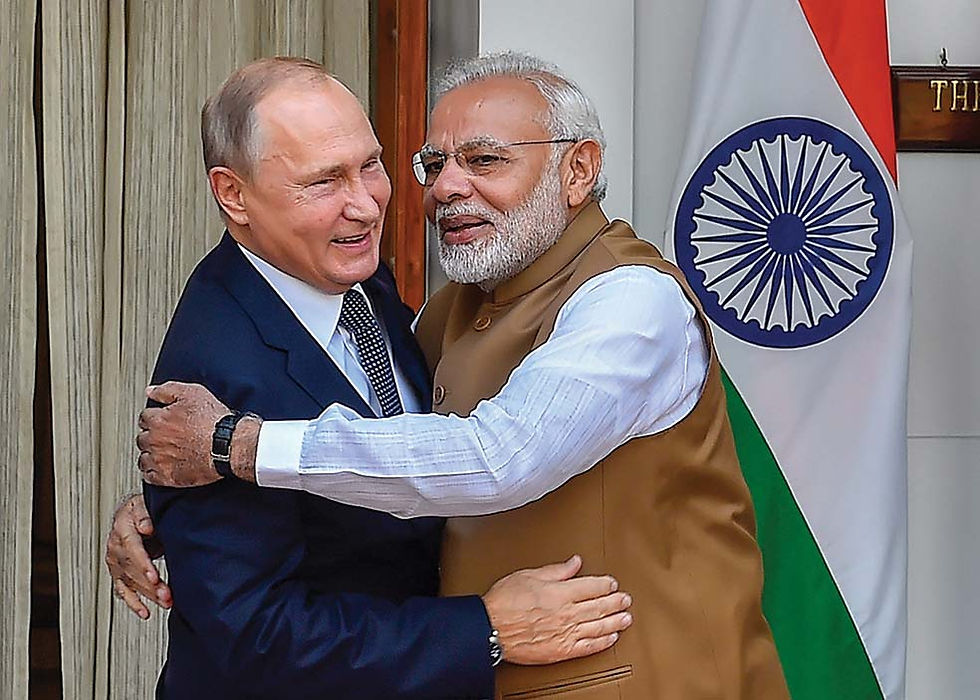
During the Cold War, the Soviet Union forged strong ties with India, epitomized by the 1971 Treaty of Peace, Friendship, and Cooperation, which laid the foundation for decades of collaboration in defence, technology and economics. The disintegration of the Soviet Union in 1991 did not mark the end of this relationship but rather, it initiated a new phase, with both nations reaffirming their commitment to strategic cooperation.
In early 2025, Russian President Vladimir Putin is expected to visit India at the invitation of Prime Minister Narendra Modi, with the Kremlin confirming the visit. The visit comes at a critical time for India as it navigates the complexities of its relationships with both the West and Russia, balancing its growing defence ties with the U.S. and its historical ties with Moscow. This diplomatic engagement, from ceremonial, is part of the reciprocal annual exchanges that have become the cornerstone of India-Russia relations. The ties between the two countries have evolved significantly over the years, with Modi and Putin meeting regularly at major international events and bilateral summits, reinforcing their shared vision of cooperation in defence, energy and trade.
Kremlin aide Yury Ushakov has emphasized the frequent communications between the two leaders, noting their direct meetings and phone calls every few months. In July, Modi travelled to Moscow for the 22nd India-Russia Summit, where both leaders addressed global security, climate change, and economic realignments. Later, in October, Modi attended the BRICS summit in Kazan, further solidifying India’s role in shaping a diverse geopolitical landscape.
India’s growing role in global forums like BRICS, the SCO, and the G20 aligns with Russia’s desire for greater influence in global governance, making their bilateral relationship all the more crucial in reshaping the future of international diplomacy.
At this juncture, India-Russia relations remain among the most enduring bilateral partnerships in modern geopolitics. Rooted in mutual respect and strategic collaboration, the partnership continues to address both traditional and emerging challenges in global affairs. Putin’s 2025 visit is particularly significant, as the world grapples with the aftermath of the COVID-19 pandemic, ongoing conflicts in Ukraine and Gaza, and the resurgence of power struggles. For Russia, this visit signals a determination to deepen ties with India, a key partner in the Global South, especially as Moscow faces growing isolation from the West due to its ongoing war in Ukraine.
For India, the visit presents an opportunity to assert its non-aligned foreign policy and advance its interests as a leader within global forums such as BRICS, the Shanghai Cooperation Organization (SCO), and the G20. India has long managed a delicate balancing act in its foreign relations, strengthening its strategic partnership with the United States while maintaining robust ties with Russia, particularly in defence and energy security. However, the evolving proximity between Russia and China, amid Western sanctions, poses a challenge for India, given its ongoing border tensions with China. Furthermore, India’s expanding defence relationship with the U.S., exemplified by initiatives like the QUAD, remains a growing concern for Moscow. Despite the strength of their political and defence ties, bilateral trade and investment between India and Russia have been underwhelming, which limits the economic potential of their partnership.
Russia’s invasion of Ukraine has created diplomatic challenges for India, which has sought to balance its historical ties with Moscow while navigating its evolving relations with the West. India remains one of the largest importers of Russian defence equipment, including advanced systems like the S-400 missile defence system and nuclear-powered submarines. Joint military exercises, such as the INDRA series, further underscore the strong defence collaboration between the two nations.
Energy cooperation is another cornerstone of the India-Russia partnership. Russia has emerged as India’s top crude oil supplier in the wake of sanctions on Moscow, which have reshaped global energy markets. India is also reliant on Russian nuclear fuel, with projects like the Kudankulam Nuclear Power Plant symbolizing their ongoing collaboration.
Despite these strong sectors, trade relations remain relatively low, and both nations have been exploring mechanisms to enhance economic exchange, including a potential rupee-rouble exchange system designed to bypass the dominance of the U.S. dollar.
Looking forward, there are significant opportunities for collaboration in technology and space exploration, particularly through joint initiatives like India’s Gaganyaan mission with Russian assistance. Additionally, projects like the International North-South Transport Corridor (INSTC) could boost regional connectivity and trade, opening new avenues for cooperation.
At the heart of India and Russia’s foreign policy lies a shared history of mutual respect and a strategic vision for navigating global dynamics. Despite the challenges posed by changing geopolitical landscapes, the resilience of this relationship remains strong, anchored in their ability to adapt to emerging opportunities and global shifts. As both nations continue to navigate an increasingly complex global order, their bilateral relations will undoubtedly remain a critical pillar in their respective foreign policies.
(The author is an educationalist. Views personal.)

Commenti